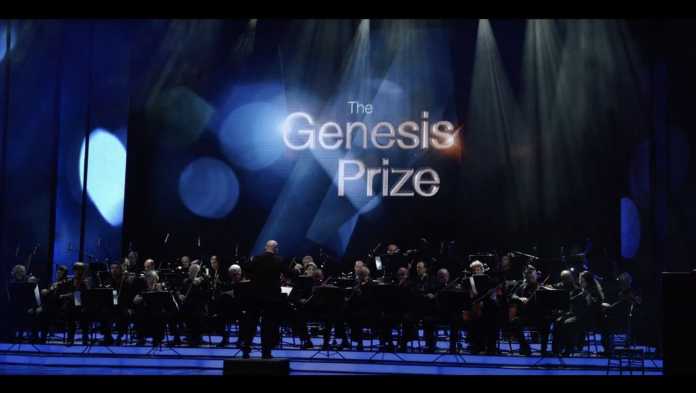The Genesis Prize Foundation remains at the forefront of efforts to nurture a proud, dynamic, thriving Jewish community worldwide.
The Genesis Prize Foundation is reshaping how individual achievement fuels communitywide contributions to Jewish philanthropy. Established to recognize and amplify the impact of Jewish individuals, the Genesis Prize has quickly become a cornerstone in global Jewish philanthropy, influencing how cultural and communal values are celebrated and propagated.
The Genesis Prize’s approach to philanthropy — focusing on empowerment, recognition, and leveraging individual achievement for communal benefit — positions it uniquely within the broader landscape of Jewish charitable efforts. By doing so, it has carved a niche that complements the efforts of other organizations and philanthropic entities aiming to foster Jewish life, culture, and values worldwide.
“The award is not a political statement, and it is not our mission to influence government policy,” said co-founder and CEO Stan Polovets. “The Genesis Prize is a humanitarian award.”
The Foundation’s role extends beyond financial contributions; it catalyzes discussion and action on vital issues affecting the Jewish and global communities. For instance, the Foundation’s recent focus on the crisis of hostages held by Hamas in Gaza exemplifies its commitment to timely and critical causes, demonstrating its philanthropic philosophy’s adaptive and responsive nature.
Established in 2013, the Genesis Prize Foundation was endowed with $100 million to establish an annual award celebrating Jewish talent and achievement. Unlike many other prizes, the Genesis Prize is not merely a recognition, but a call to philanthropic action. Each laureate is awarded $1 million, traditionally matched by other philanthropists, to dedicate toward causes they are passionate about, thereby amplifying their impact.
This philanthropy model, leveraging celebrity and success for broader charitable initiatives, is predicated on the Jewish value of “tikkun olam,” or repairing the world. The prize recognizes individuals who attain excellence and international renown in their professional fields, inspire others through their dedication to Jewish values, and commit to improving the global community.
Genesis Prize Laureates
The influence of the Genesis Prize can be measured by the caliber and diversity of its laureates, who span various fields from arts and culture to science and advocacy. Annual prizes have gone to individual laureates as well as to others for lifetime achievement and, in 2023 and 2024, to groups of organizations and activists for humanitarian work. Notable winners include:
- 2014: Michael Bloomberg, former mayor of New York City, was recognized for his long-standing public service and philanthropy career.
- 2015: Michael Douglas, an award-winning actor and producer, was awarded for promoting greater inclusion and diversity within the Jewish community.
- 2016: Itzhak Perlman, the eminent violinist and conductor, received the prize for his contributions to music and dedication to people with disabilities.
- 2017: Anish Kapoor, a renowned sculptor, was honored for his influence in the art world and activism in refugee causes.
- 2018: The Oscar-winning actress Natalie Portman was recognized for her social activism and advocacy for women’s rights.
- 2018: That same year, Ruth Bader Ginsburg, associate justice of the United States Supreme Court, received the inaugural Genesis Lifetime Achievement Award. The award recognized Ginsburg’s lasting legacy and her notable impact on the legal landscape and the lives of countless individuals worldwide.
- 2019: Robert Kraft, owner of the New England Patriots, was acknowledged for his philanthropy and commitment to combating antisemitism.
- 2020: Natan Sharansky, a former Soviet refusenik and human rights icon, was chosen for his lifelong struggle for human rights.
- 2021: Steven Spielberg, one of the most influential film directors of his generation, was chosen for his cultural influence and staunch opposition to antisemitism and all forms of intolerance.
- 2022: Pfizer CEO Albert Bourla was honored for his crucial role in developing a COVID-19 vaccine, a key milestone in the global battle against the pandemic.
- 10th-anniversary laureate: Barbra Streisand, the much-awarded actor, singer, author, director, and activist, was chosen for her artistic achievements and lifelong commitment to speaking out against injustice.
- 2023: Jewish activists and nongovernmental organizations supporting Ukraine were chosen; prize funds were allocated to urgent humanitarian efforts supporting victims of the war in Ukraine and reinforcing the impacted Jewish community. This decision showcased the foundation’s flexibility and dedication to tackling pressing global emergencies, underscoring the significance of unity and assistance during critical times.
The 2024 Genesis Prize honored Israeli organizations working to free hostages from Gaza and supporting their families. This focus on the collective action of groups addressing an urgent humanitarian crisis emphasized the critical values of community, solidarity, and support in challenging times.
The foundation aims to give laureates a meaningful Jewish experience and recognition, inspiring them to engage more deeply with Jewish life and culture.
The Impact of Leadership: Stan Polovets
At the helm of this transformative agenda is co-founder and CEO Stan Polovets, who has led the prize since its inception in 2013.
In May 2020, Polovets was appointed chairman of the board at Anchiano Therapeutics Ltd., a Nasdaq-listed biopharmaceutical company focused on discovering and developing cancer treatments. His leadership prowess was previously demonstrated during his tenure as CEO of the Alfa-Access-Renova Consortium, a private equity firm managing a global energy portfolio worth over $25 billion.
Polovets represented TNK during its merger with BP, forming one of the world’s largest oil companies. He also played a pivotal role in the sale of the merged entity, TNK-BP, for $55 billion. His extensive background includes management, advisory, mergers and acquisitions, and financial roles at prominent organizations such as ExxonMobil, KPMG, EY, and The Rand Corporation.
His governance expertise extends to multiple sectors and institutions. Polovets has served as the lead non-executive director of Clal Industries and L1 Energy and as the lead independent director at Taavura and Nesher. His academic and nonprofit engagements include serving on the board of overseers at Stanford University’s Hoover Institution, as chairman for Eastern Europe at Edelman, and as a director at oil companies Slavneft and TNK-BP. He is a member of the board of overseers of New York University Tandon School of Engineering, the NYU President’s Global Council, and the Council on Foreign Relations.
In 2006, Polovets founded the Vnimanie Foundation, which provided support to Russian children with learning disabilities and behavioral disorders.
Polovets is an alumnus of Stanford Business School. He holds a master’s degree in Russian and East European studies from Stanford University, underscoring his diverse expertise and commitment to business and philanthropy.
Under Polovets’ leadership, the Foundation continues to evolve its unique and impactful approach to meeting emerging challenges and philanthropic opportunities.
The photo in the article is provided by the company(s) mentioned in the article and are used with permission.







